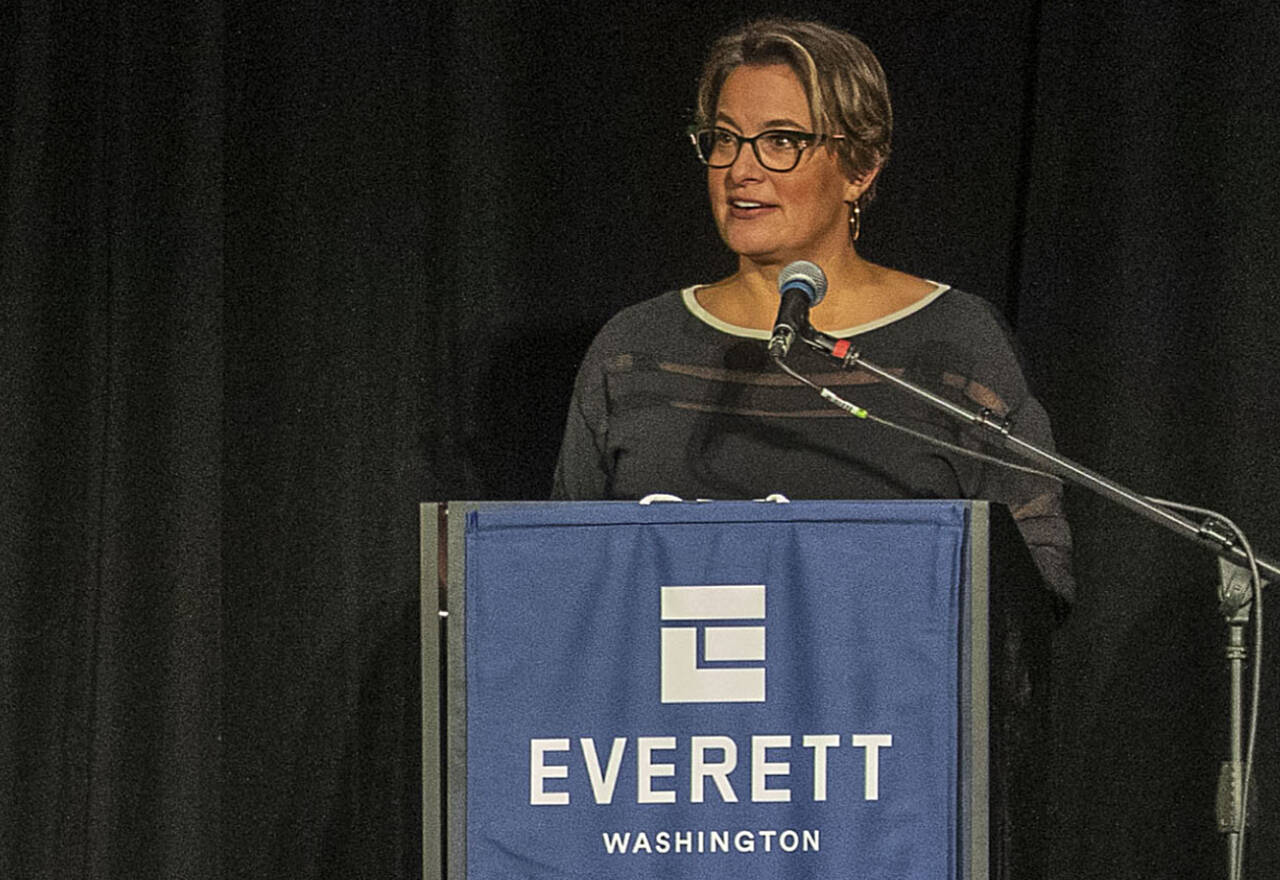By The Herald Editorial Board
Part shout-out opportunity and part to-do list, “state of” addresses offer leaders of government — federal, state and local — a platform to highlight accomplishments and challenges, then outline new and regrouped efforts to address tasks ahead.
Following that formula, Everett Mayor Cassie Franklin’s State of the City address on Thursday at the Edward Hansen Conference Center, filled much of the 40-minute speech with plenty of the acknowledgements and achievements by the city and others, including the new Emma Yule Park; a new and much-needed child care center — the Bezos Academy — at Everett Station, funded through federal covid funds from Snohomish County; a downtown now stretching post-covid festival muscles with music, arts, sports and food events; a huge expansion of the Imagine Children’s Museum; the strength of businesses and industries, new and existing, including the planned addition of a 737 line at Boeing’s Everett plant; and past policy wins, such as the first class of the city’s Community Police Academy and a Guns for Gift Card event that collected 240 unwanted firearms.
“Clearly, Everett has some great things going for it,” Franklin said, transitioning to the to-do list. “But our city faces some serious challenges, some of which are reaching a critical level.”
Franklin outlined five directives detailing her administration’s initiatives regarding violence prevention and reduction, access to behavioral health, housing supply and choice, climate action and sustainability, and making Everett a prosperous city.
Some items of note from each:
On the city’s challenge with violent crime, Franklin pointed to last year’s 41 percent increase in shots-fired calls, a 33 percent increase in firearm thefts and the four shootings — one fatal — that occurred in a 24-hour period in mid-December. To better address violent crime, the mayor is reallocating resources to repurpose the city’s gang response unit as a violent crime unit. Also included in the directive are plans to develop violence prevention and response programs, continue work to promote the safe storage of firearms, work with local school districts on anti-gun violence and violence prevention curriculum and pursue state legislation that would give local jurisdictions greater authority for gun-control measures.
Everett’s concerns regarding behavioral health and drug and alcohol addiction, common among all cities, are clear, and the administration is turning to its Community Development department to undertake a compassionate approach. Among the initiatives, the city plans to partner with local agencies, nonprofits and providers to improve access to treatment, support work for behavioral health facilities and partner with the countywide Opioid Multi-Agency Coordination group, as well as continue joint work with the Mayors and Business Leaders for Public Safety group that Franklin and others launched last year to pursue legislation this session that is realizing some success thus far. As well, the city plans to expand its embedded social worker program to provide that outreach through the city’s fire department and at its two libraries.
With a forecasted need to provide about 36,000 more homes in the coming 20 years and the need to shelter a fair share of the more than 1,100 in the county without adequate shelter each night, Franklin is looking to continue recent efforts that started with its Rethink Housing effort to improve the supply of housing by streamlining permitting and providing building incentives to provide the “missing middle” as part of the range of housing necessary. Toward that end, Everett’s mayor and council have largely backed legislation in Olympia that forfeits some local zoning control to allow more housing options for duplex and multiplex housing in neighborhoods dominated by single-family residences, a solution opposed elsewhere. Franklin, in a briefing prior to Thursday’s address, said one concern she has is for sustaining the availability of lower-income housing, especially as work begins to map out the route and stations for Sound Transit’s Link Light Rail line into Everett.
With more frequent occurrences of extreme weather and the now regular arrival of persistent wildfire smoke in Western Washington, Franklin recommends renewed emphasis on efforts to address climate change and energy sustainability, through its Climate Action Plan, such as the ongoing work to transition Everett Transit’s fleet to electric buses, converting city buildings away from fossil fuels and developing an Urban Forest Management plan.
With the constraints of a structural budget deficit for the city continuing — and few palatable prospects for an increase in tax receipts — Franklin is emphasizing the revenue potential in economic development of businesses and industries, but in particular for recreation, entertainment and the arts. Among the possibilities, with the advancement in recent years of the Everett AquaSox Minor League Baseball team to long-season A status, comes upgraded expectations from MiLB for the Frogs’ stadium. Work has begun to find potential sites for a 15,000-seat outdoor stadium, with room for a park and outdoor amphitheater, perhaps near Everett Station. Financing for such a facility won’t be simple, favoring a public-private partnership that includes the AquaSox, the city, the county, the county’s sports commission and others but excludes financing through tax dollars, an outcome that Seattle’s Climate Change Arena proved on a much larger scale.
Franklin, in wrapping up her address, admitted to being a dreamer but also a believer in Everett. Not all might agree with the direction and detail of the directives and initiatives that she has set out, but her priorities have kept focus on the best interests of Everett and its residents and businesses. That to-do list laid out, city officials, residents, businesses, nonprofits and others should begin discussions on new proposals, continue planning on existing programs and finish the work now underway on others.
It could make a satisfying highlight reel for “state of” addresses in coming years.
Talk to us
> Give us your news tips.
> Send us a letter to the editor.
> More Herald contact information.

























